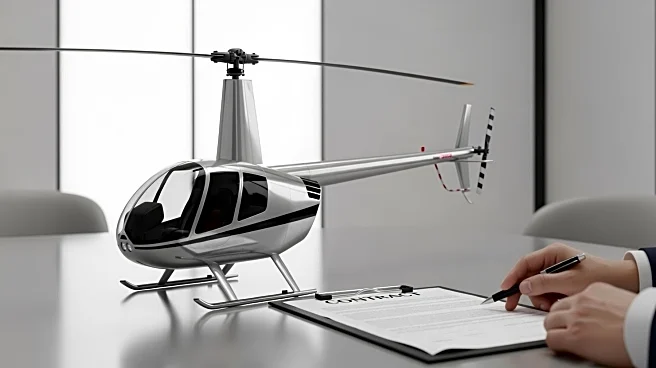What's Happening?
Greece is set to formally receive its 20th and final NH90 medium-lift helicopter, marking the completion of an order placed in August 2003. NHIndustries (NHI), the manufacturer, is negotiating national
support contracts to enhance the availability of the Hellenic Army's fleet. The final NH90 has arrived in Greece, but the formal acceptance process is still underway, involving necessary paperwork before the helicopter is officially handed over. The fleet includes 16 helicopters in the Troop Transport Helicopter configuration and four configured for special operations. Despite the delivery of 19 helicopters, nine have been cannibalized for spare parts, rendering them non-viable as airframes. This situation underscores the importance of support contracts for maintenance and parts procurement, as highlighted by NHI's president, Axel Aloccio.
Why It's Important?
The delivery of the final NH90 helicopter and the negotiation of support contracts are crucial for maintaining the operational readiness of Greece's military aviation capabilities. The cannibalization of helicopters for spare parts indicates a pressing need for structured maintenance and support systems to ensure fleet sustainability. This development is significant for Greece's defense strategy, as it enhances the Hellenic Army's ability to conduct troop transport and special operations. The support contracts will likely improve fleet availability, reducing downtime and increasing operational efficiency. This move could also influence regional security dynamics, as Greece strengthens its military capabilities amid ongoing geopolitical tensions in the region.
What's Next?
The formal acceptance of the final NH90 helicopter is expected to proceed once the necessary paperwork is completed. Following this, the implementation of national support contracts will be crucial to address the current fleet's maintenance challenges. These contracts will facilitate the procurement of parts and repairs, ensuring the helicopters remain operational. The Hellenic Army may also explore further modernization or expansion of its aviation capabilities, potentially influencing defense procurement strategies. Stakeholders, including Airbus Helicopters, will likely monitor the situation closely to ensure successful contract negotiations and fleet management.
Beyond the Headlines
The situation highlights broader issues in military procurement and maintenance strategies, emphasizing the need for comprehensive support systems to sustain advanced military equipment. The cannibalization of helicopters for parts reflects challenges faced by many military forces globally, where budget constraints and logistical hurdles impact fleet readiness. This development may prompt discussions on improving procurement processes and establishing robust maintenance frameworks to prevent similar issues in the future.









